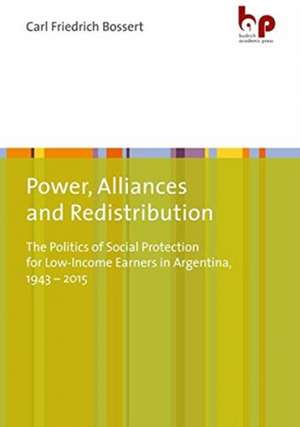Power, Alliances, and Redistribution – The Politics of Social Protection for Low–Income Earners in Argentina, 1943–2015
Autor Carl Friedrich Bosserten Limba Engleză Paperback – 8 iun 2022
Preț: 495.29 lei
Preț vechi: 556.50 lei
-11% Nou
Puncte Express: 743
Preț estimativ în valută:
94.77€ • 99.22$ • 78.42£
94.77€ • 99.22$ • 78.42£
Carte disponibilă
Livrare economică 17-31 martie
Livrare express 01-07 martie pentru 32.20 lei
Preluare comenzi: 021 569.72.76
Specificații
ISBN-13: 9783966650281
ISBN-10: 3966650282
Pagini: 374
Dimensiuni: 148 x 210 x 23 mm
Greutate: 0.45 kg
Editura: Columbia University Press
ISBN-10: 3966650282
Pagini: 374
Dimensiuni: 148 x 210 x 23 mm
Greutate: 0.45 kg
Editura: Columbia University Press
Cuprins
1. INTRODUCTION
2. THEORIZING THE POLITICS OF SOCIAL PROTECTION FOR LOW-INCOME EARNERS IN LATIN AMERICA
2.1. Review: Welfare State Theory and Social Protection for Low-Income Earners
2.2. Theoretical Framework
2.2.1. The Power Resources Approach and Latin America: Strengths, Weaknesses and Promising Modifications
2.2.2. The Main Argument: Power Resources and Governing Alliances
2.2.3. Understanding the Role of Different Actors: An Analytical Framework
2.2.4. The Role of Different Actors: Hypotheses
2.2.5. (Re-)Conceptualizing Popular Class Power in Social Policy-Making: Associational, Structural, Institutional, and Discursive Power Resources
3. METHODOLOGICAL APPROACH
4. THE POLITICS OF SOCIAL PROTECTION FOR LOW-INCOME EARNERS
IN ARGENTINA, 1943-2015
4.1. Historical Background and Social Policy before 1943
4.2. Popular Class Incorporation and Social Policy Expansion, 1943-1955
4.3. Military Interventions, Exclusionary Governing Alliances,
and Regressive Social Policy Reform, 1955-1973
4.4. Social Policy Expansion and Political Conflict
during the Second Peronism, 1973-1976
4.5. The Retrenchment of Social Policy under a
Neoliberal Dictatorship, 1976-1983
4.6. Return to Democracy, Stagflation, and the Failed Attempt of Inclusionary Social Policy, 1983-1989
4.7. Neoliberalism and Regressive Social Policy Reform, 1989-2001
4.8. Crisis, Paradigm Change and the Expansion of Social Protections for Low-Income Earners, 2002-2015
4.9. Outlook: The Formation of a New Regressive Governing Alliance and the Return of Retrenchment after 2015
5. ANALYSING THE STRUCTURAL BASES, ACTORS AND POLITICAL MECHANISMS OF CHANGE
5.1. Social Policy towards Low-Income Earners during Different Periods: Between Truncated and Inclusionary Social Protection
5.2. Constellations of Actors and Interests in the Argentine Politics of Social Protection for Low-Income Earners
5.3. The Distribution of Power Resources and Social Protection for Low-Income Earners
5.4. Governing Alliances and Social Protection for Low-Income Earners
6. CONCLUSIONS
2. THEORIZING THE POLITICS OF SOCIAL PROTECTION FOR LOW-INCOME EARNERS IN LATIN AMERICA
2.1. Review: Welfare State Theory and Social Protection for Low-Income Earners
2.2. Theoretical Framework
2.2.1. The Power Resources Approach and Latin America: Strengths, Weaknesses and Promising Modifications
2.2.2. The Main Argument: Power Resources and Governing Alliances
2.2.3. Understanding the Role of Different Actors: An Analytical Framework
2.2.4. The Role of Different Actors: Hypotheses
2.2.5. (Re-)Conceptualizing Popular Class Power in Social Policy-Making: Associational, Structural, Institutional, and Discursive Power Resources
3. METHODOLOGICAL APPROACH
4. THE POLITICS OF SOCIAL PROTECTION FOR LOW-INCOME EARNERS
IN ARGENTINA, 1943-2015
4.1. Historical Background and Social Policy before 1943
4.2. Popular Class Incorporation and Social Policy Expansion, 1943-1955
4.3. Military Interventions, Exclusionary Governing Alliances,
and Regressive Social Policy Reform, 1955-1973
4.4. Social Policy Expansion and Political Conflict
during the Second Peronism, 1973-1976
4.5. The Retrenchment of Social Policy under a
Neoliberal Dictatorship, 1976-1983
4.6. Return to Democracy, Stagflation, and the Failed Attempt of Inclusionary Social Policy, 1983-1989
4.7. Neoliberalism and Regressive Social Policy Reform, 1989-2001
4.8. Crisis, Paradigm Change and the Expansion of Social Protections for Low-Income Earners, 2002-2015
4.9. Outlook: The Formation of a New Regressive Governing Alliance and the Return of Retrenchment after 2015
5. ANALYSING THE STRUCTURAL BASES, ACTORS AND POLITICAL MECHANISMS OF CHANGE
5.1. Social Policy towards Low-Income Earners during Different Periods: Between Truncated and Inclusionary Social Protection
5.2. Constellations of Actors and Interests in the Argentine Politics of Social Protection for Low-Income Earners
5.3. The Distribution of Power Resources and Social Protection for Low-Income Earners
5.4. Governing Alliances and Social Protection for Low-Income Earners
6. CONCLUSIONS
